Arsenal Women 2024/25 Season Review: Transformation and Triumph
From October crisis to European champions: Slegers' tactical revolution delivers 62-goal season, runner-up finish, and first Champions League title since 2007.
Executive Summary
Arsenal Women's 2024/25 campaign was a tale of two seasons in one. A dismal start under Jonas Eidevall gave way to a dramatic mid-season renaissance under interim-turned-permanent head coach Renée Slegers, culminating in a runner-up finish domestically and a historic UEFA Women's Champions League title.
The Gunners began the season inconsistently, winning just one of their first four league games and languishing well behind the pace. Eidevall's resignation in October amid that "very poor start" marked the turning point. Slegers, previously an assistant, stepped in and ignited an immediate turnaround – Arsenal went unbeaten in her first 11 matches in charge, winning 10 and drawing 1.
The team's attacking flair and defensive solidity both surged, reflected in a jump from 1.25 points per game under Eidevall to 2.39 under Slegers. By season's end Arsenal had the league's most prolific offense and a visibly renewed identity, even as they fell 12 points short of a historically dominant Chelsea side in the Women's Super League (WSL).
Ultimately, Arsenal conquered Europe – lifting their first Champions League trophy in 18 years with a stunning 1–0 upset of holders Barcelona in the final.
Context & Objectives (as of 31 August 2024)
Fresh off a third-place finish in 2023/24 – their fourth season in a row without the title – Arsenal began 2024/25 determined to break Chelsea's five-year domestic stranglehold and lift a first WSL crown since 2019. Head coach Jonas Eidevall, who signed a long-term extension the previous October, remained in charge and was tasked with knitting together a refreshed squad that mixed proven quality with new arrivals.
The headline addition was Spain play-maker Mariona Caldentey, signed on a free from Barcelona to add goals and invention, while World-Cup-winning centre-back Laia Codina entered her second season after joining in August 2023.
Arsenal also faced early challenges. Record scorer Vivianne Miedema left for Manchester City in July 2024, creating a goalscoring void; Beth Mead, back since October 2023, was still regaining peak sharpness; and captain Leah Williamson's ACL comeback in January 2024 meant this would be her first full pre-season in 18 months.
Off the pitch, the club doubled down on its growth strategy, having already staged five WSL fixtures at Emirates Stadium in 2023/24 and planning even more marquee games to boost revenue and fan engagement.
With fresh talent, returning leaders and sky-high expectations, the Gunners entered 2024/25 aiming to convert squad investment and Emirates-sized ambition into silverware on both domestic and European fronts.
The Managerial Revolution
Few managerial shake-ups have been as immediate and impactful as Arsenal’s October overhaul. Jonas Eidevall entered 2024/25 highly regarded – he had guided Arsenal to third place in the 2023/24 WSL – but his pragmatic approach appeared to stall and results nosedived early.
The Crisis Period
Arsenal opened their league campaign with:
2–2 home draw v Manchester City
1–0 win away at Leicester
0–0 draw v Everton
1–2 defeat v Chelsea
That left the Gunners on 5 points from 4 WSL matches, sitting mid-table by mid-October.
Across all competitions under Eidevall they won 4 of their first 9 games, scoring 17 and conceding 10 – respectable on paper, yet the performances felt unconvincing.
Flash-point in Europe
On 9 October 2024 Arsenal were humbled 5-2 away to Bayern Munich in their opening UEFA Women’s Champions League group fixture – their heaviest European defeat of the Eidevall era.
The Resignation
After a further league setback – the 2-1 home defeat to Chelsea on 12 October – pressure became untenable. Jonas Eidevall resigned on 15 October 2024.
Arsenal turned to his assistant, 35-year-old Renée Slegers, appointing her as interim head coach.
The Transformation Under Slegers
Slegers' appointment proved nothing short of transformational. Her first six matches across all competitions yielded 5 wins, 1 draw, 19 goals scored and just 2 conceded – a stark contrast to the lackluster figures under Eidevall.
Under Slegers, the Gunners nearly doubled their points per game and goals per game, while xG rose and xGA remained low. Eidevall’s early-season numbers reflect a team underperforming its potential.
Slegers galvanized the squad through:
Tactical Simplification — She retained a similar base formation (4-2-3-1) but made key tweaks, re-instilling a high press and quicker ball circulation
Player Freedom — Emphasized player freedom in attack and accountability in defense
Strategic Personnel Decisions:
Kim Little restored as the midfield fulcrum, anchoring the double-pivot and dictating tempo.
Steph Catley moved inside to LCB, providing a natural left-foot for cleaner build-up and extra aerial security, freeing McCabe/Fox to stay high.
Deployed Mariona Caldentey slightly deeper as a roaming “left 8/10,” allowing her vision to unlock play and create overloads beside Little before arriving late in the box.
Data Impact — Arsenal’s xG per game leapt from ~1.7 to ~2.3 after October, while xGA remained < 1.0 despite the more expansive style.
Squad Turnover & Key Changes
Key Departures
Vivianne Miedema (CF) → Manchester City
Sabrina D’Angelo (GK) → Aston Villa
Cloé Lacasse (FW) → Utah Royals (NWSL)
Kathrine Møller Kühl (CM) → AS Roma
High-Profile Signings (Summer 2024)
Mariona Caldentey (AM/False 9) from Barcelona
Daphne van Domselaar (GK) from Aston Villa
Rosa Kafaji (RW/AM) from BK Häcken
January 2025 Reinforcements
Jenna Nighswonger (LB/LCB) from NJ/NY Gotham FC
Chloe Kelly (RW/LW) loan from Manchester City
Big Picture
Arsenal trimmed wage spend (Miedema & depth exits) to re-invest in a modern keeper, a creative hub, and athletic wide options.
League Performance Deep Dive
Arsenal's final league standing – 2nd place with 48 points (15 W, 3 D, 4 L) – belies the rollercoaster nature of their WSL journey. Chelsea's invincible campaign (19–3–0, 60 points) set an all-time WSL points record, finishing 12 points clear of Arsenal.
Attack Analysis
Arsenal's attack in 2024/25 was the most prolific in the WSL, firing in 62 goals across 22 matches to top the league scoring charts. While Chelsea embraced a more balanced, rotating frontline, Arsenal leaned into a star-driven approach — powered by clinical finishing and high shot efficiency. Their Expected Goals (xG) total of 47.9 narrowly trailed Chelsea's, but the Gunners outperformed their xG by over 14 goals, showcasing one of the sharpest attacking edges in the league.
Key Attacking Metrics
Goals & Efficiency
2.82 goals per game (up from 2.41 last season – best in the league)
Shot conversion rate: 15.1% (best in the league)
Shot accuracy: 39% (3rd in the league)
Volume & Expected Performance
378 shots (17.18 per 90 – second only to Chelsea)
xG total: 47.9 (~2.18 xG per match – second only to Chelsea)
+14.1 goals vs xG differential (WSL-best finishing performance)
* Rank among 12 WSL clubs.
† Percentage change (or pp = percentage-points) from 2023/24 to 2024/25.
‡ Conversion rate uses only Arsenal goals (excludes the five opposition own-goals that swell the official total to 62).
Defensive Analysis
Arsenal Women remain one of the WSL’s stingiest defensive units, but the numbers hint at a subtle shift in how that resilience is being maintained. They still lead the league in limiting volume-based threats — ranking 1st for shots faced(183) and opponent touches in the box (272), and 2nd for shots-on-target faced (70) — yet all three figures have crept upward compared with 2023/24. That slight loosening of control is reflected in goals against rising to 26 (1.18 per 90, 3rd) and expected goals against climbing to 20.5 (2nd), up 14 %. In short, opponents are getting marginally more joy in and around the area, and Arsenal are conceding more frequently than last year, even if the underlying chance quality remains relatively well contained.
Some of these numbers are also skewed by two surprising late-season slips — a 5–2 loss at Aston Villa and 4–2 defeat at Brighton — which came during their build-up to the UEFA Women’s Champions League final. Prior to those matches, Arsenal had conceded just 17 goals across their first 20 league games.
The good news: clean sheets are up. Arsenal’s clean-sheet rate has jumped from 31.8 % to 50 %, the 2nd-best in the league — a strong return for a team that transitioned midseason from Jonas Eidevall to Renée Slegers. That improvement offsets a minor dip in save percentage (68.5 %, down 0.4 pp and ranked 3rd), suggesting the goalkeepers are facing slightly better chances but the collective shape in front is still holding firm.
Tactical Evolution & Identity
Slegers simplified Arsenal’s approach, leaning on a flexible 4-2-3-1 that morphs into a 4-3-3 in possession.
Key tactical elements
High-tempo, possession build-up with rapid vertical surges — 62.5 % average possession (2nd in WSL)
Fluid front four — Maanum, Russo, Mead/Foord/Kelly rotate lanes and depths to unsettle back-lines
High-intensity press — PPDA in the low-9s keeps opponents pinned
Asymmetric back four — McCabe pushes high while Fox tucks inside, forming a back-three plus one
Ruthless end product — 62 league goals, most in the division
In short, it was “evolution, not revolution.” Slegers kept Arsenal’s ball-dominant DNA but amped up the press and transition speed, turning a good attack into the league’s most prolific while preserving defensive balance.
Player-Level Analysis
Several players’ performances defined Arsenal’s season, with many showing marked improvement under Renée Slegers’ tutelage. Alessia Russo was perhaps the biggest beneficiary — after scoring just once in her first six appearances under Jonas Eidevall, she went on to score in six consecutive WSL matches following Slegers’ appointment, quickly emerging as Arsenal’s most in-form forward.
Alessia Russo - The Spearhead
Alessia Russo emerged as Arsenal's attacking spearhead under Slegers, finishing as WSL co-Top Scorer with 12 goals in 21 appearances alongside Man City's Khadija Shaw. After initially struggling for service following her 2023 move from Manchester United, the 24-year-old thrived in Slegers' system, converting at a clinical rate of 12 goals from just 9.5 xG.
Beyond her lethal finishing (0.64 goals per 90 vs 0.47 non-penalty xG per 90), Russo's intelligent pressing and elite hold-up play demonstrated her complete transformation into a world-class striker. With Russo leading the line, Arsenal had a constant goal threat – a key factor in their high-scoring run.
Mariona Caldentey - The Catalyst
Mariona Caldentey proved an inspired summer signing from Barcelona, contributing 9 goals and 5 assists while splitting time between wing and attacking midfield positions. The 28-year-old Spanish forward brought elite creativity with a league-high 199 progressive passes, 65 passes into penalty area(also league-high) and ice-cold composure as Arsenal's designated penalty taker, converting 4 of 5 spot-kicks including a crucial late winner vs Bayern in the Champions League.
Her versatility allowed Slegers tactical flexibility—deploying her as a left winger cutting inside or slightly deeper as a roaming “left 8/10” linking and dictating play—while her 0.71 G+A per 90 ranked among the team's best. Mariona added crucial big-game experience and championship mentality that Arsenal needed.
Frida Maanum - The Complete Engine
Frida Maanum cemented her status as one of the WSL’s most complete midfielders in 2024/25, producing 7 goals and 2 assists in 1,301 league minutes—an efficient 0.62 goal contributions per 90 backed up by 0.58 xG + xAG per 90. Her trademark third-man runs terrorised back lines, and two of her seven goals stand out: the 25-yard curler that won November’s Goal of the Month in the 5-0 win over Brighton and the composed finish that doubled Arsenal’s lead in their 3-0 derby victory at Spurs.
Off the ball she remained one of Arsenal’s key receivers between the lines, ranking second-best in the squad for progressive passes received (146) while also completing 75 progressive passes of her own. That mix of late-box surges, ball progression and willingness to drop into the double-pivot when Renée Slegers flipped shapes made the 25-year-old an indispensable “all-action eight” in Arsenal’s high-tempo midfield.
Beth Mead - The Comeback Queen
The Euro 2022 Golden Boot winner steadily rebuilt form after nearly 11 months out, finishing the 2024/25 campaign with 7 goals and 3 assists in just 13 starts (21 total appearances). Her efficiency stood out—matching Alessia Russo’s team-best 0.75 goal contributions per 90 minutes and showcasing clinical finishing, with 7 goals from approximately 4.1 xG.
Operating predominantly on the right wing and cutting onto her favoured left foot, Mead restored a key attacking dimension Arsenal had lacked in the early season: sharp deliveries and composed decision-making in the final third.
Kim Little - The Orchestrator
At 34, captain Kim Little once again set Arsenal’s tempo from the No 6/8 positions. Despite her minutes being carefully managed (1,205 in 20 WSL outings), she still produced a team joint-best five (5) assists and one goal. Little’s distribution remained elite: 766 completed passes at an 89.4 % success rate – the highest accuracy among Arsenal’s regular out-fielders – plus 65 progressive passes and 57 entries into the final third.
Little’s combination of creative incision, press-resistant poise and veteran leadership still beats at the heart of Arsenal’s midfield. After fracturing a finger in late January and undergoing minor surgery, Little returned on 16 February and Arsenal immediately reeled off a five-match unbeaten run that reignited their mid-season surge underscoring how much they rely on their captain to conduct the orchestra.
Katie McCabe - The Versatile Warrior
Katie McCabe embodied Arsenal’s Swiss-army-knife in 2024/25. Ever-present at left-back, wing-back and even wide-midfield, she started nearly every league match (20) and logged 1,665 minutes while chipping in 5 assists and 1 goal. Her assist tally trailed only Kim Little’s six but still ranked joint-second in the squad and translated to 0.27 assists per 90 minutes. Her WSL-best 51 chances created and league-leading 7.3 expected assist goals show how frequently her service deserved a finishing touch.
Set against the backdrop of ever-shifting shapes – from 4-2-3-1 to a 3-4-3 – McCabe’s ability to toggle between disciplined defender, overlapping creator and advanced wide playmaker gave Arsenal tactical flexibility and a competitive edge. With her trademark intensity and left-footed whip, she remains every inch the “versatile warrior” who stitches this Arsenal side together.
Leah Williamson - The Defensive Leader
Upon her return from ACL, Williamson was re-installed at centre-back. The England captain logged 19 WSL appearances (17 starts, 1 583 minutes) and chipped in two goals . Her distribution was elite: 131 progressive passes and a league-best 182 completed passes into the final third ( ≈ 10.3 per 90) – the highest single-player total recorded in the 2024/25 WSL – gave Arsenal a direct line-breaking outlet from deep .
Beyond the numbers, her vocal organization knitted together a back line reshuffled by summer departures and injuries; giving Arsenal the mix of poise, progression and authority.
🟨 Honourable Mentions
Caitlin Foord: Silent contributor with 6 goals and 2 assists in the league, one of the league’s most relentless direct dribbler with a team-high 62 progressive carries. and also ranked second-best in the league for progressive passes received (190).
Stina Blackstenius: 5 goals and 3 assists despite only 4 league starts, embraced her super-sub role with several crucial late goals, ultimately becoming the Champions League hero with the winning goal in the final
Historical Context & Benchmarking
European Achievement
Second UWCL title (first since 2007) – ending an 18-year wait.
Only English women’s club with multiple European Cups.
Will represent UEFA at the inaugural FIFA Women’s Champions Cup in 2026.
Domestic Progress
48 pts (2nd) – two shy of last season’s 50-pt.
62 goals, +36 GD – both best since 2021-22.
First top-two finish since 2021-22.
Fan Engagement
28,808 average attendance (highest in WSL)
56,784 North London Derby crowd (second-highest WSL attendance ever)
All home WSL games to be at Emirates Stadium next season
Looking Ahead: 2025/26 Challenges & Opportunities
After a season that transformed from crisis to European glory, Arsenal must now prove they can sustain this momentum while conquering the domestic front they've chased for six years:
Squad Evolution
Arsenal's tactical renaissance under Slegers has created a clear template for success:
Strategic Reinforcements: Having successfully navigated Vivianne Miedema's summer 2024 departure through tactical adaptation, Alessia Russo's emergence, and crucially Mariona Caldentey's transformational impact, Arsenal's focus shifts to building on their European success. Caldentey elevated everyone around her with her vision, creativity, and championship mentality. If Arsenal can secure another player of her caliber and experience, they'll have the foundation for sustained European dominance. In the immediate, making Chloe Kelly's loan move permanent would be a smart piece of business—her pace and directness on the wing have already proven with the impact she had on the team upon her arrival.
Youth Integration: Rosa Kafaji showed flashes of brilliance in limited minutes, while the January addition of Jenna Nighswonger provides long-term defensive depth. The challenge will be maintaining development pathways while competing at the highest level.
Squad Continuity: Frida Maanum's contract renewal represents a major coup—securing one of the WSL's most complete midfielders for the long term. However, some other key figures are potentially moving into the final 12-18 months of their contracts in 2025/26. Securing these core will be key to preserving the chemistry that powered Arsenal’s European triumph.
⚠️ Key Risks
The Slegers Test: While her transformation has been remarkable, Slegers now faces the pressure of expectations. Can she maintain this level with a target on Arsenal's back and the weight of being defending European champions?
Breaking Down Low Blocks: Arsenal's high-tempo, possession-heavy style thrived against teams that engaged them. The real test comes when opponents sit deep and force them to unlock stubborn defenses—a challenge that has historically troubled the Gunners.
The Chelsea Factor: Despite Arsenal's European triumph, Chelsea's domestic invincibility (60 points, unbeaten) shows the mountain they must climb. Can Arsenal's emotional high translate into the week-to-week consistency needed to dethrone the Blues?
Reclaiming Domestic Dominance
The immediate target in 2025/26 is clear: end Chelsea's six-year stranglehold on the WSL title. Arsenal's 48 points represented progress, but Chelsea's 60-point perfection set a new benchmark.
The encouraging signs are there—Arsenal's 62 goals (most in the league) and renewed tactical identity under Slegers provide a foundation. But consistency remains the key. Those late-season slips (5-2 at Villa, 4-2 at Brighton) cannot happen in a title race.
Defensively, while Arsenal remained stingy (26 goals conceded, 3rd best), the slight uptick in chances allowed suggests room for improvement.
European Validation
Arsenal's Champions League triumph wasn't just about ending an 18-year wait—it established them as a genuine European powerhouse again. The challenge now is proving it wasn't a one-off.
As defending champions, every opponent will raise their game. Arsenal must show they can handle the pressure of being hunted rather than hunting. Their tactical evolution under Slegers—from pragmatic to progressive—gives them the tools, but execution under pressure will be everything.
Conclusion
Arsenal Women's 2024/25 season will be remembered as the campaign where they rediscovered their soul.
From the depths of October despair under Eidevall to the heights of European glory under Slegers, this was a masterclass in how the right leadership can unlock dormant potential. They didn't just win the Champions League—they did it with style, substance, and a renewed identity that had been missing for years.
From 1.25 points per game to 2.39, from tactical confusion to tactical clarity, from crisis to champions. Few transformations in football have been as dramatic or as complete.
As we look ahead, the rest of the WSL—and Europe—is asking a familiar question with a new twist:
"Can Arsenal sustain this magic?"
The foundation is there. The manager is proven. The squad is hungry.
Now comes the hardest part: proving that 2024/25 wasn't just a beautiful anomaly, but the beginning of a new Arsenal era.
Champions of Europe. Challengers for England.
The revolution is complete. The dynasty begins now.
This analysis is based on official WSL statistics, UEFA match data, Opta data via FBref, Arsenal FC and opponent club match reports, and published tactical reviews by trusted analysts. All figures are current as of 31 May 2025.
👋 Stay Connected
If you want weekly WSL insights, stat deep dives, and match previews, subscribe and share! We’d also love to hear your thoughts — reply or comment below 💬
Follow @WSLAnalytics on X for bite-sized stats and updates.


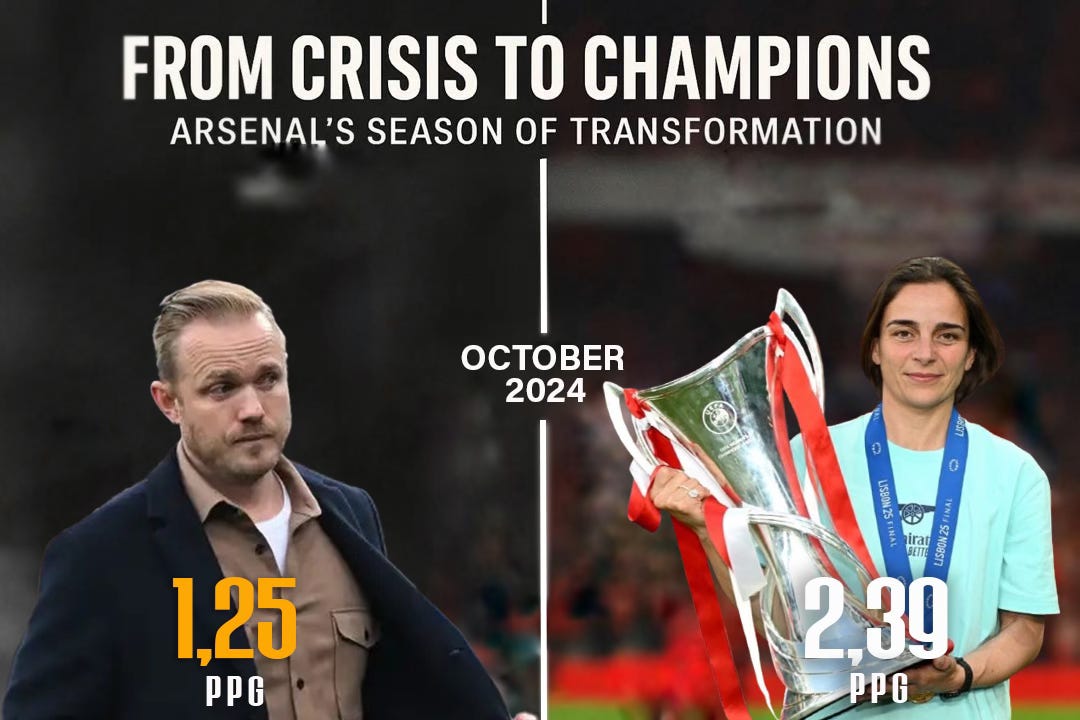
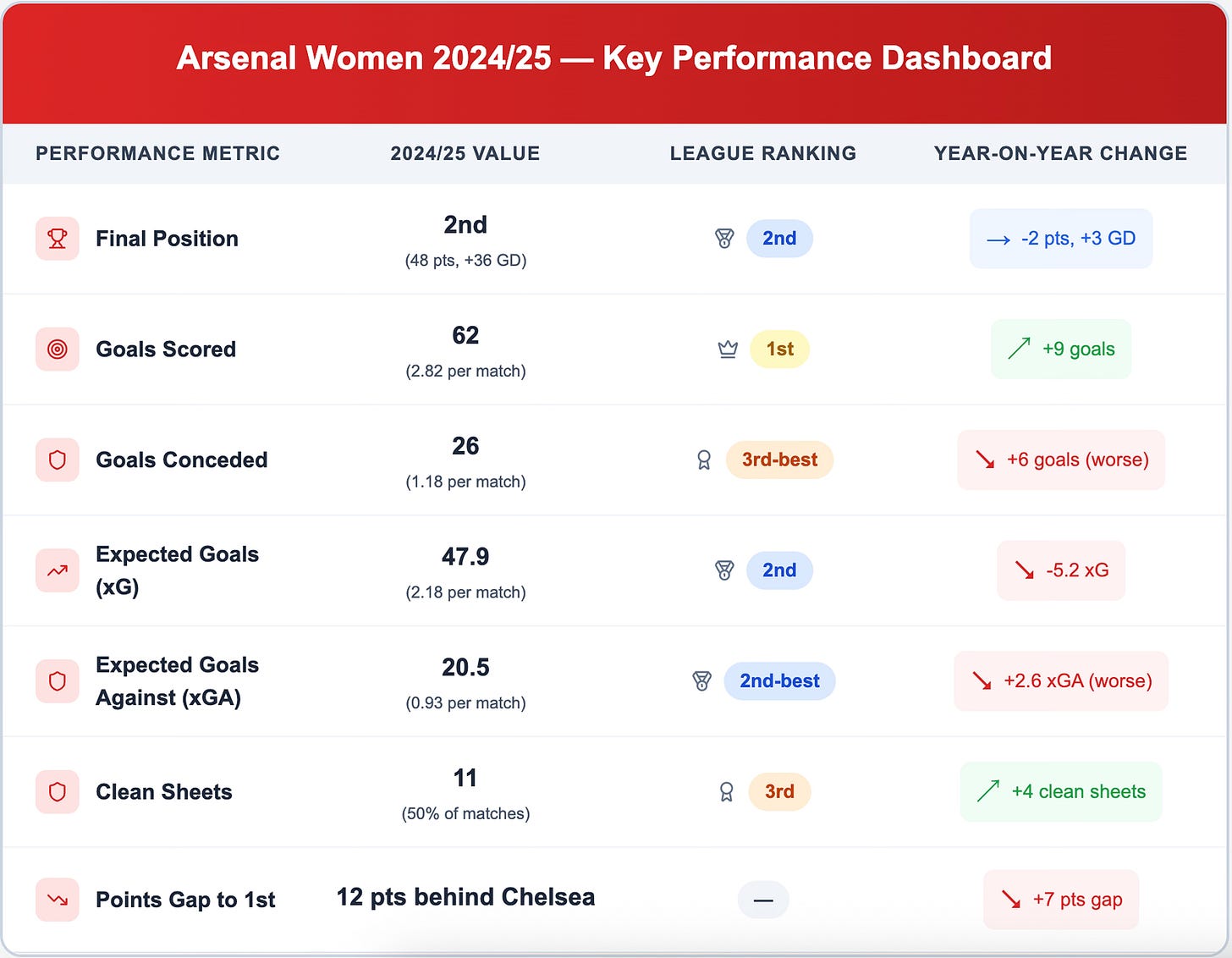
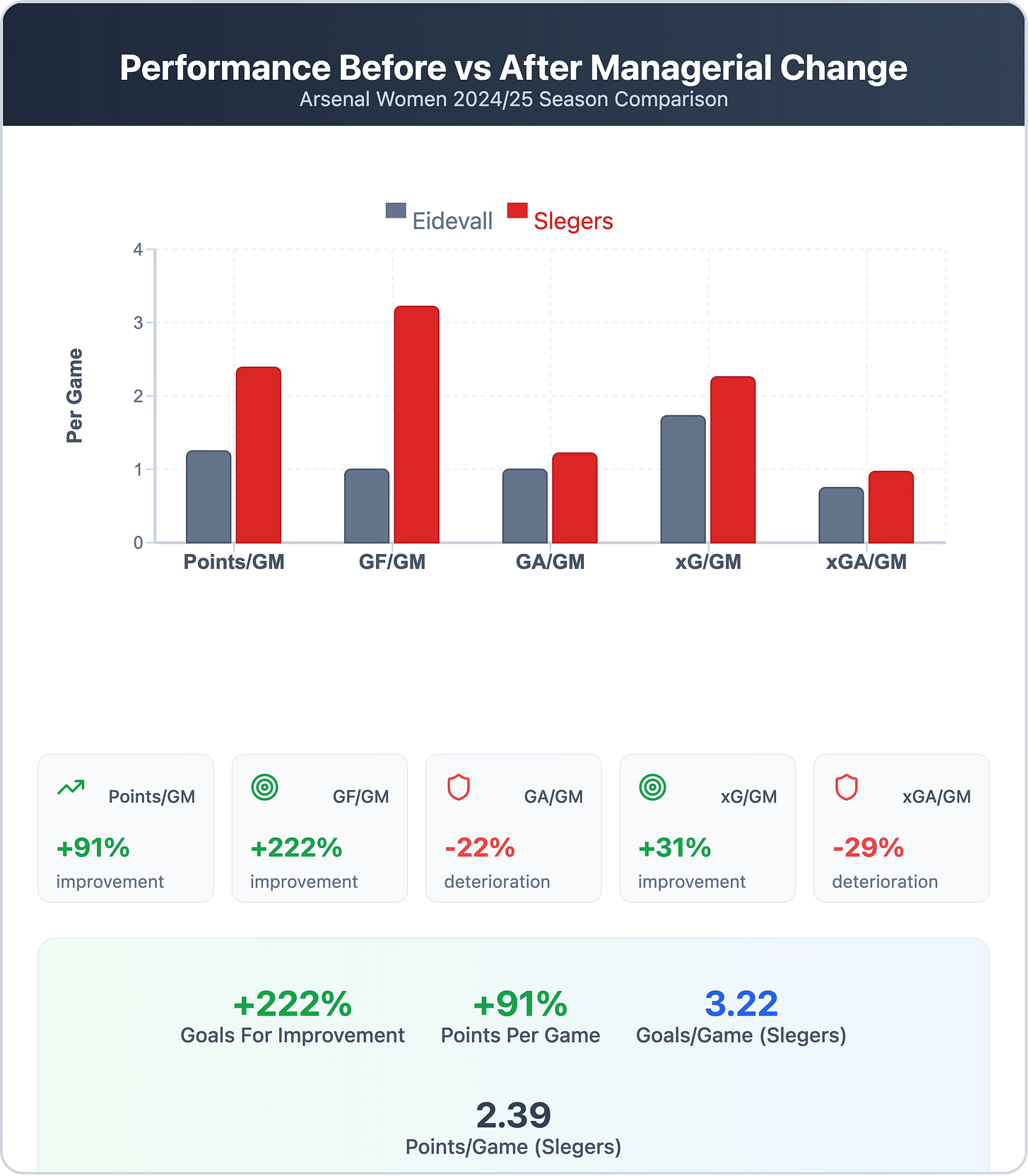
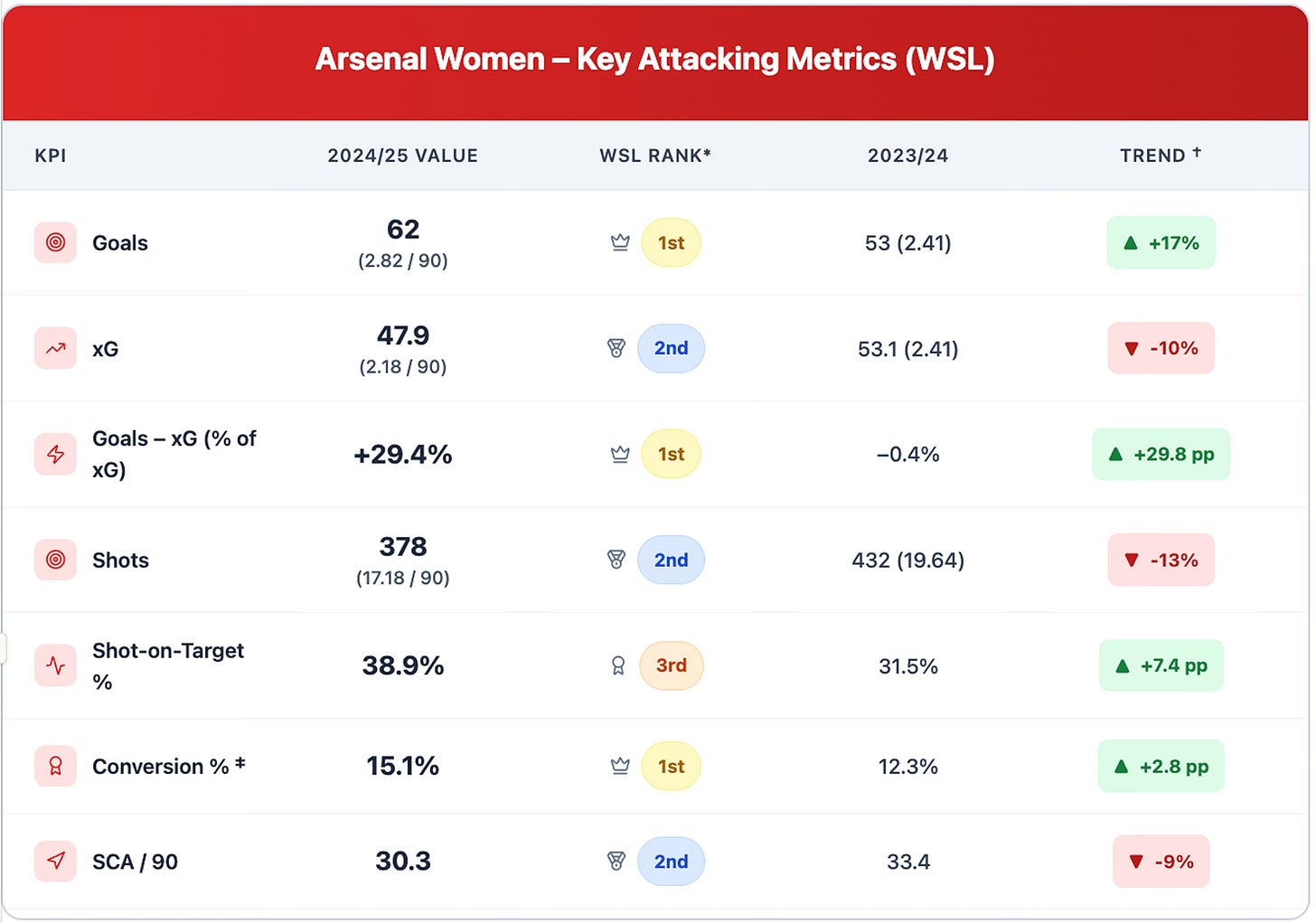

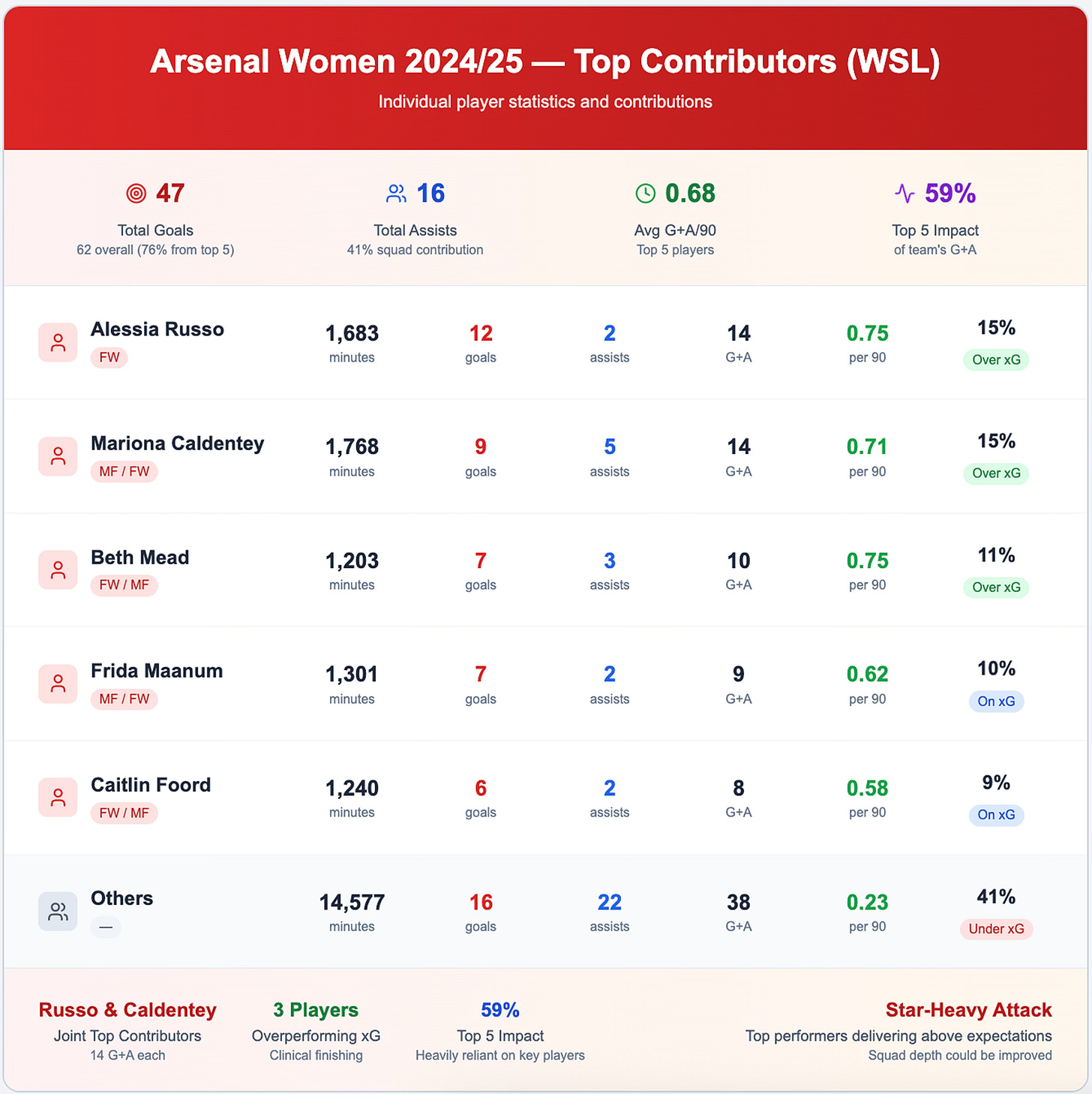
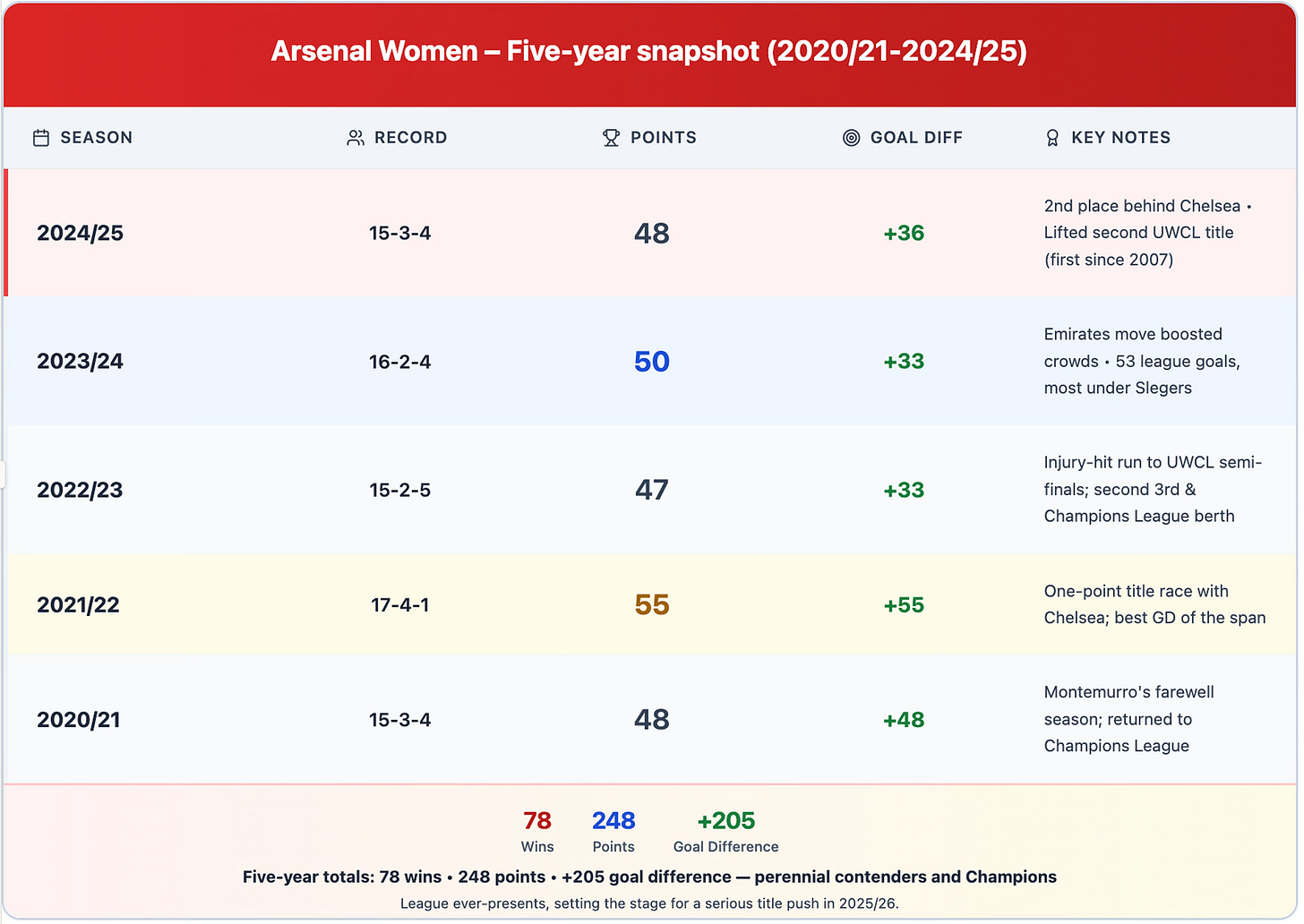
I love this! Could you do one for each club ahead of the season???
Ah interesting read, but Leah is not our captain. That honour belongs to Kim Little.